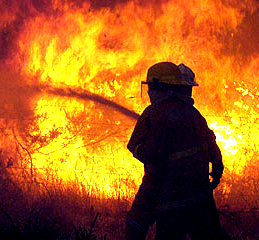Firey's sleep issues studied
 Researchers have investigated lack of sleep among firefighters.
Researchers have investigated lack of sleep among firefighters.
They found that elevated and unsustainable levels of firefighter fatigue and/or degradation of firefighters’ work performance could increase their individual risk of injury, increase demand on other crew members, and compromise the overall bushfire suppression operation.
Dr Grace Vincent from CQUniversity says the research has highlighted the quantity and quality of sleep as a significant and potentially modifiable factor impacting operational performance.
She says firefighters’ sleep is restricted during deployments to bushfires, particularly when shifts have early start times or long durations, and when firefighters are sleeping in temporary accommodation. Other factors can include smoke, heat and noise.
“While firefighters may be capable of physically performing tasks, they are also at increased injury risk due to cognitive impairment,” Dr Vincent says.
Studies have shown that during multi-day bushfire operations firefighters obtained 54 minutes less sleep than on routine days. The data also indicated that shifts longer than 14-hours were associated with 48 minutes less sleep than shifts less than 14 hours.
Given that sleep quantity was reduced on days fighting bushfires, fire agencies should focus on modifying specific characteristics of work shifts (e.g., shift length, shift start time, sleeping location) to improve firefighters’ sleep quantity during deployments.
Dr Vincent recommends provision of cool, dark and quiet sleeping environments which are away from arriving crew members. Ear-plugs could be provided too.
“Incorporating their likely higher fatigue risk into next-day (or night) planning is critical,” she says.
“The trigger points for employing these countermeasures may change within and between deployments.
“Work shifts should be structured to provide rest periods during shifts and sufficient recovery opportunities between shifts.
“Increasing levels of ‘sleep knowledge’ within fire agencies can help them structure work patterns and fatigue management policies, in order to avoid accident and injury risk amongst firefighters.”
Dr Vincent says the longer-term impacts of sleep restriction on firefighters’ physiological and mental health require further research.







 Print
Print